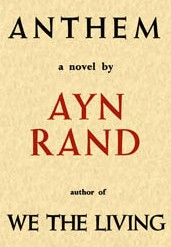Orwell: Bad, but for Different Reasons
Tuesday, November 28, 2017
Over at The American Interest is an article that is highly critical of George Orwell. Ben Judah rightly faults Orwell for anti-Semitism, but his main complaints -- that Orwell (1) doesn't "honestly grapple with complexity" and (2) is "morally zealous" are, respectively, (1) worth considering and (2) not something to be concerned about. A counterexample, coming from the top authority on the thought of Ayn Rand might be helpful to consider here, both as a means of understanding these points and introducing a far better alternative to Orwell in terms of writing cautionary novels about collectivism and of predicting the future:
Ayn Rand "grappled with complexity," throughout her literary career, notably creating an entire philosophic system for the purpose of being able to project a heroic man. Among the many fruits of this labor were an intimate understanding of the necessity of freedom for man to function as a rational animal within a society, something Orwell clearly lacks despite (perhaps, his anti-Semitism notwithstanding) his heart being in the right place.Ayn Rand is more realistic than the panicky anti-communists of the Cold War era, who trembled before the alleged practicality of dictatorship. The best symbol of this issue is the contrast between two projections of a collectivist future: George Orwell's 1984 vs. Ayn Rand's Anthem (which was published more than a decade earlier, in 1938). Orwell regards freedom as a luxury; he believes that one can wipe out every vestige of free thought, yet still maintain an industrial civilization. Whose mind is maintaining it? Blank out. Anthem, by contrast, shows us "social cogs" who have retrogressed, both spiritually and materially, to the condition of primitives. When men lose the freedom to think, Ayn Rand understands, they lose the products of thought as well. [link added] (Leonard Peikoff, in Objectivism: The Philosophy of Ayn Rand, p. 362)
Image via Wikipedia.
Note further that this grappling resulted in clarity about many other matters, such as about the issue of "extremism," of which I am sure the essayist might accuse Rand and Orwell equally, but wrongly. A strong moral stand, if for the right cause and the right reason, and taken effectively, is moral and practical. In this respect, the author is wrong to indict Orwell for zealousness as such, and opens the door to condemn Rand out of hand, before anyone even begins to consider her rich and fruitful thinking.
-- CAV


No comments:
Post a Comment